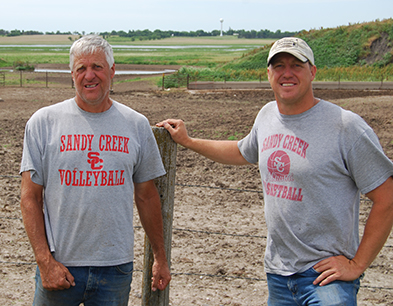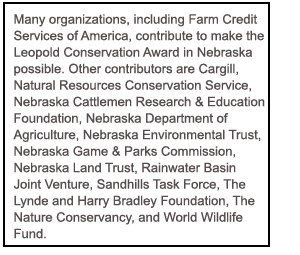 Brian Shaw talks about the learning curve that goes with grazing wetlands in Nebraska’s Rainwater Basin, specifically, when and for how long to graze; which cattle to rotate through less nutrient-rich grasses; the best management practices for uplands vs. wetlands.
Brian Shaw talks about the learning curve that goes with grazing wetlands in Nebraska’s Rainwater Basin, specifically, when and for how long to graze; which cattle to rotate through less nutrient-rich grasses; the best management practices for uplands vs. wetlands.
He notes that his family values conservation. But as fourth- and fifth-generation farmers, father and son also are pragmatists who approach wetlands management as businessmen. “It has to make economic sense for our operation,” Brian says.
What Brian doesn’t mention is the many hours he and his father, Steve, have spent educating conservationists about the needs of producers so more cattlemen can use wetlands to benefit their operations. Or the work the Shaw family has put into helping re-establish and promote plant communities that benefit cattle as well as waterfowl. Or the stewardship that followed an August 2013 storm that heavily damaged fields, including the Shaws’. To prevent leaching of nitrogen and to reduce soil erosion, the Shaw family farm -- managed also by Vicki Shaw and Julie Shaw -- planted cover crops on damaged fields, then worked with other Clay County area farmers to do the same, contracting to graze the cover crops.
 These and other details come from the dozen or so people whose letters of support led to the Shaw family being awarded the Nebraska Leopold Conservation Award, named for conservationist and author Aldo Leopold, who called for an ethical relationship between people and the land they own and manage. Conservationists, educators, commodity representatives, government officials and wildlife advocates praise the Shaws for helping to turn what many considered wasteland (including thousands of acres of idled land) into grazing land.
These and other details come from the dozen or so people whose letters of support led to the Shaw family being awarded the Nebraska Leopold Conservation Award, named for conservationist and author Aldo Leopold, who called for an ethical relationship between people and the land they own and manage. Conservationists, educators, commodity representatives, government officials and wildlife advocates praise the Shaws for helping to turn what many considered wasteland (including thousands of acres of idled land) into grazing land.
The Shaws’ operation “exemplifies how a diversified row-crop/cattle operation can be economically viable and provide quality wildlife habitat in the Rainwater Basin,” wrote Kenny Dinan, the Nebraska Partners for Fish and Wildlife coordinator for the U.S. Fish and Wildlife Service.
The Shaws are not new to natural resource management. Steve joined the board of the Little Blue Natural Resources District in 2007, helping to convince the NRD to take a leadership role in holding title to a portable corral system as a means to promote grazing in the area’s wetlands. Father and son have worked with the U.S. Department of Interior for nearly a decade to help federal authorities implement a variety of grazing and haying treatments on Waterfowl Production Areas.
Then, a few years ago, the Shaws had the opportunity to buy wetlands restored by Ducks Unlimited. Brian says the Shaws aren’t the first farmers to find economic value in the Rainwater Basins’ wetlands. But they are early adopters of practices that benefit both agriculture and the environment. If cattle don’t graze, the wetlands become overrun with reeds and boorish, and the ducks and geese don’t have seeds to eat.
The key to managing the wetlands from a producer’s perspective is understanding the benefits and limitations of the land as pasture, Brian says. The Shaws, for example, irrigate the uplands to keep the wetlands healthy through dry periods. While some wetland plants produce nitrogen, the Shaws also will add nitrogen as needed. They have learned when and for how long to graze to ensure the wetlands are in top condition for the arrival of migrating waterfowl. They keep cows and calves in need of nutrient-rich diets off the swamp, using the lower-nutrient grasses of the wetlands for growth.
The wetland tract restored by Ducks Unlimited “is doing everything we want,” Brian says. “It’s a good addition to our operation.” So much so that the Shaws are returning 80 acres of cropland (about 15 to 20 acres of which regularly flooded out) to wetlands.
It’s a special opportunity “to be involved in an industry where one can have a positive impact on the environment and wildlife while at the same time earning a living and protecting the natural resources for future generations,” Brian said.

